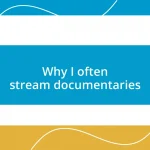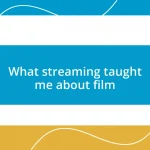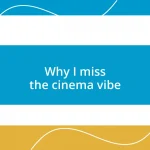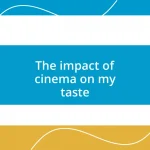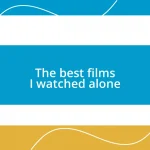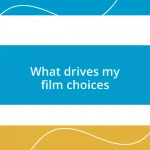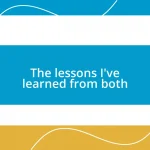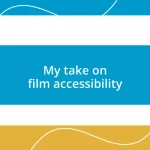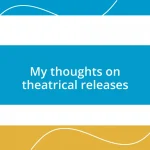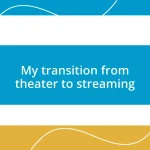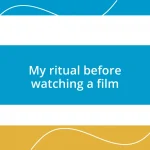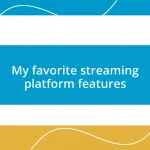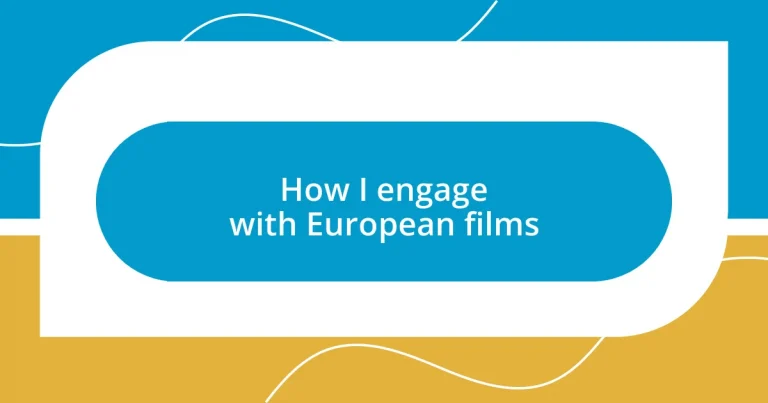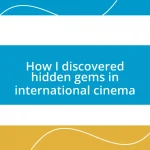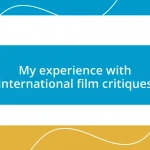Key takeaways:
- European cinema reflects diverse traditions and societal values, offering varied storytelling styles such as introspective narratives and innovative genres like thriller and romantic comedy.
- Engaging with film festivals and local communities enhances the appreciation of European films, fostering connections between filmmakers and audiences while showcasing unique narratives.
- Utilizing streaming platforms provides access to a broader range of European films, encouraging exploration of cultural contexts and supporting the discovery of lesser-known cinematic gems.
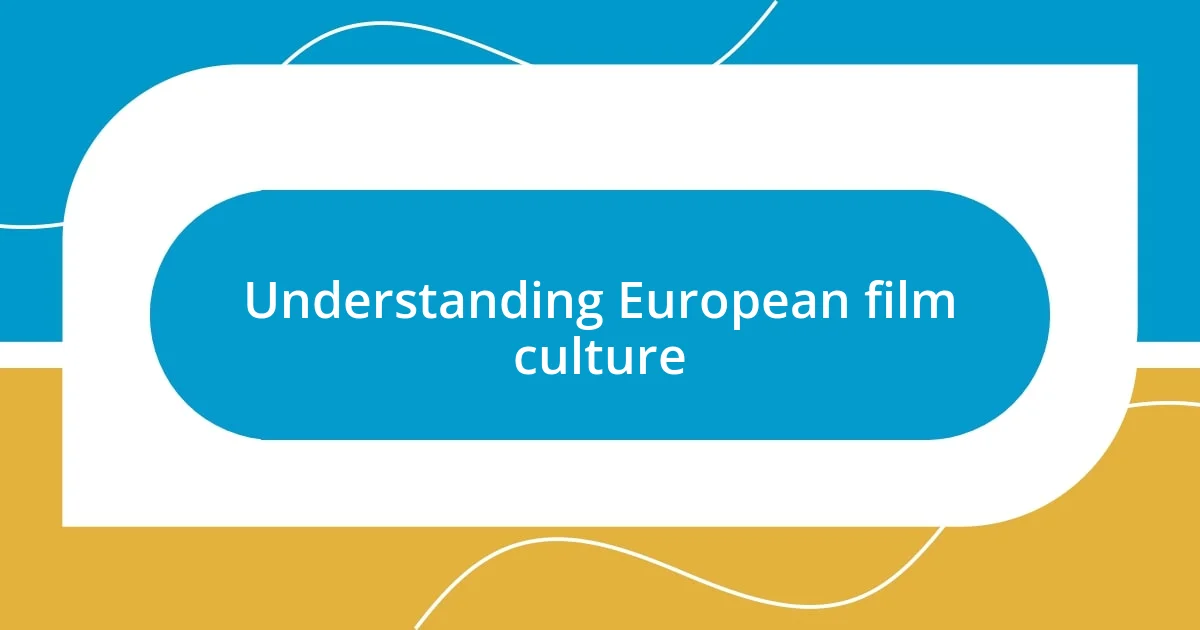
Understanding European film culture
European film culture is a tapestry woven from diverse traditions, languages, and histories. I remember the first time I watched a French film, “Amélie”—its whimsical narrative and surreal visuals transported me to a world that felt both familiar and entirely new. Have you ever found yourself captivated by a film that opens a door to an entirely different way of life? That’s the magic of European cinema.
Each country’s cinema reflects its unique societal values and historical experiences. For example, Italian neo-realism profoundly shaped how stories were told, focusing on everyday life and the struggles of ordinary people. I often find myself pondering how these films can resonate so deeply with viewers, transcending borders and blending personal stories with universal themes. Isn’t it fascinating how a single film can mirror the collective heartbeat of a nation?
Additionally, the emphasis on artistic expression and character development in European films often leads to quieter, more introspective storytelling. I recall watching a slow-paced Danish film that challenged my expectations; it lingered on moments of silence and subtlety, leaving me with a sense of reflection for days afterward. These experiences remind me that sometimes, the journey within a film is just as significant as the plot itself. What are your thoughts on the slower, more meditative pace that many European films embrace?
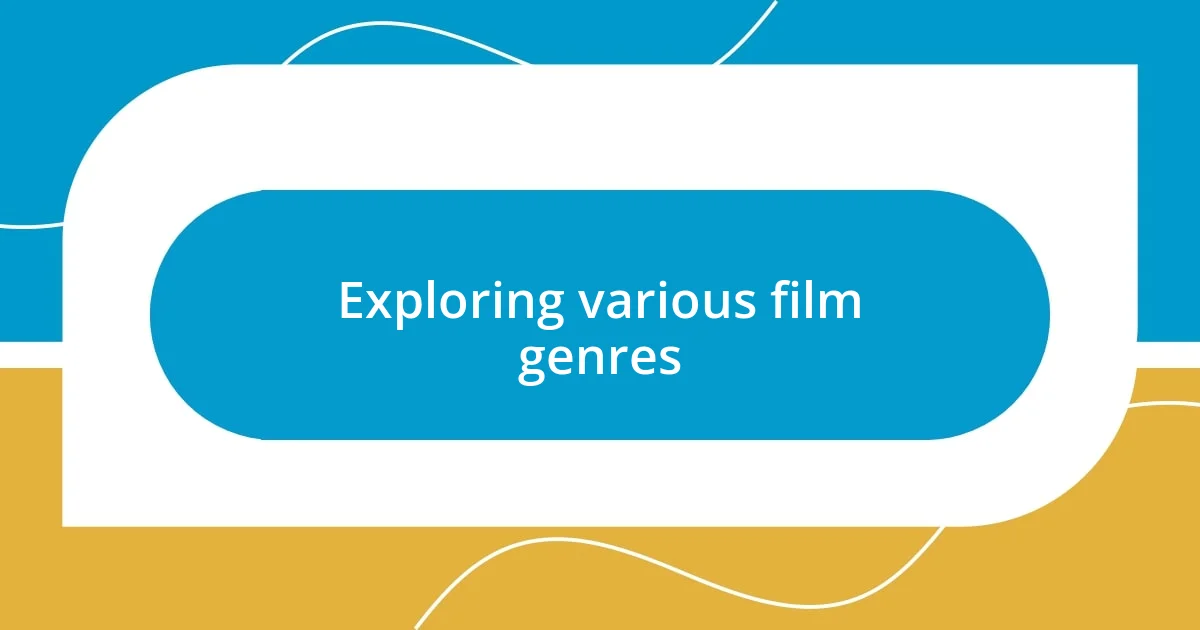
Exploring various film genres
Exploring various film genres allows me to appreciate the nuanced storytelling in European cinema. For instance, I remember the first time I stumbled upon a gritty Scandinavian thriller. It was unlike anything I had encountered before—dark, atmospheric, but deeply character-driven. It made me reconsider what suspense could be, challenging the conventions I was accustomed to in mainstream cinema.
On the flip side, the romantic comedies from regions like Spain or Italy have a charm that simply warms my heart. They often blend humor with poignant moments, capturing the essence of love and relationships with such authenticity. I vividly recall laughing out loud during a light-hearted Spanish film while simultaneously feeling a bittersweet tinge as it reflected my own experiences in love. Isn’t it wonderful how a genre can evoke a wide range of emotions?
As I delve into these genres, I notice how various cultural lenses shape the narratives. The whimsical tales of magical realism in films from Portugal invite me to suspend my disbelief and explore the extraordinary in the ordinary. I’d love to hear—what genres have resonated with you, and how do they mirror your experiences or reflections on life?
| Genre | Characteristics |
|---|---|
| Thriller | Dark, suspenseful, character-driven |
| Romantic Comedy | Humorous, authentic, often bittersweet |
| Magical Realism | Extraordinary elements in everyday situations |
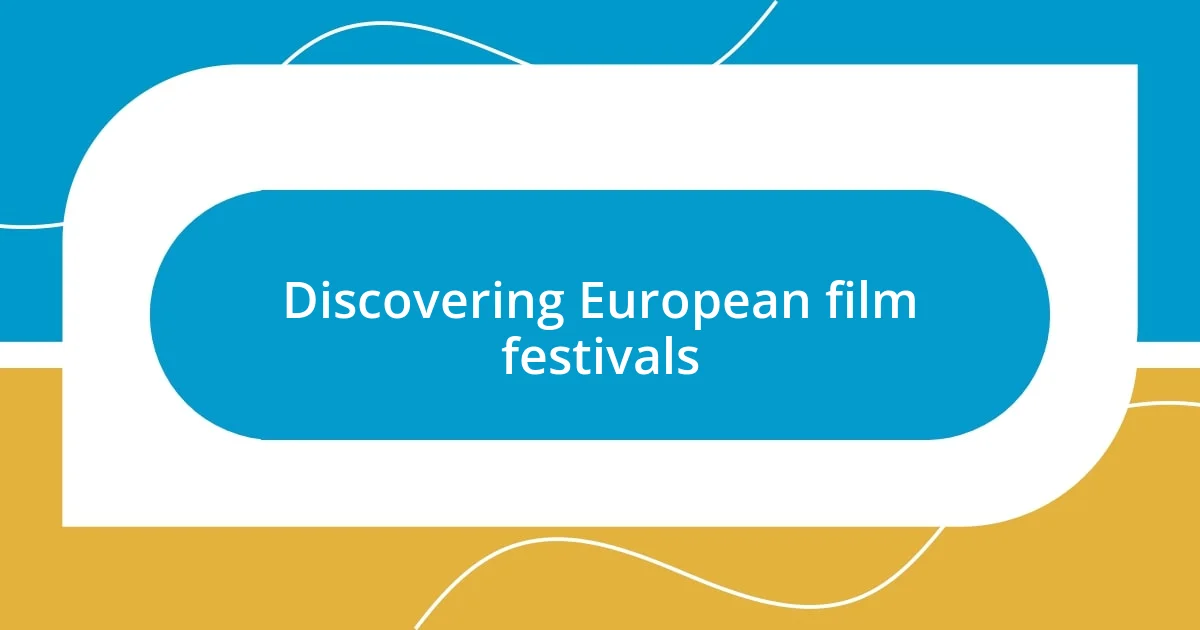
Discovering European film festivals
European film festivals have truly become my playground for discovering new cinematic gems and connecting with diverse cultures. Attending these festivals is like stepping into a vibrant community where stories unfold in unexpected ways. I recall the excitement of mingling with filmmakers and fellow enthusiasts at the Berlin International Film Festival, feeling the pulse of innovation and creativity that electrified the atmosphere. Have you ever found yourself in the midst of passionate discussions about films that resonated with your soul?
These festivals showcase a rich array of films, each representing unique narratives and artistic visions. Here are some of the festivals that have left a lasting impression on me:
- Cannes Film Festival: Known for glitz and glamour, it highlights films that push boundaries and challenge norms.
- Berlin International Film Festival: A hub for independent filmmakers, it embraces socio-political narratives and diverse storytelling.
- Venice Film Festival: Offers a picturesque backdrop while presenting a blend of traditional and avant-garde cinema.
I find that immersing myself in these environments truly enhances my appreciation for European cinema. Each festival is a microcosm of cultural diversity and a testament to the transformative power of film. While exploring these festivals, I’ve discovered not only breathtaking talent but also the stories that bridge connections among people from different backgrounds. What have your experiences been like at film festivals?
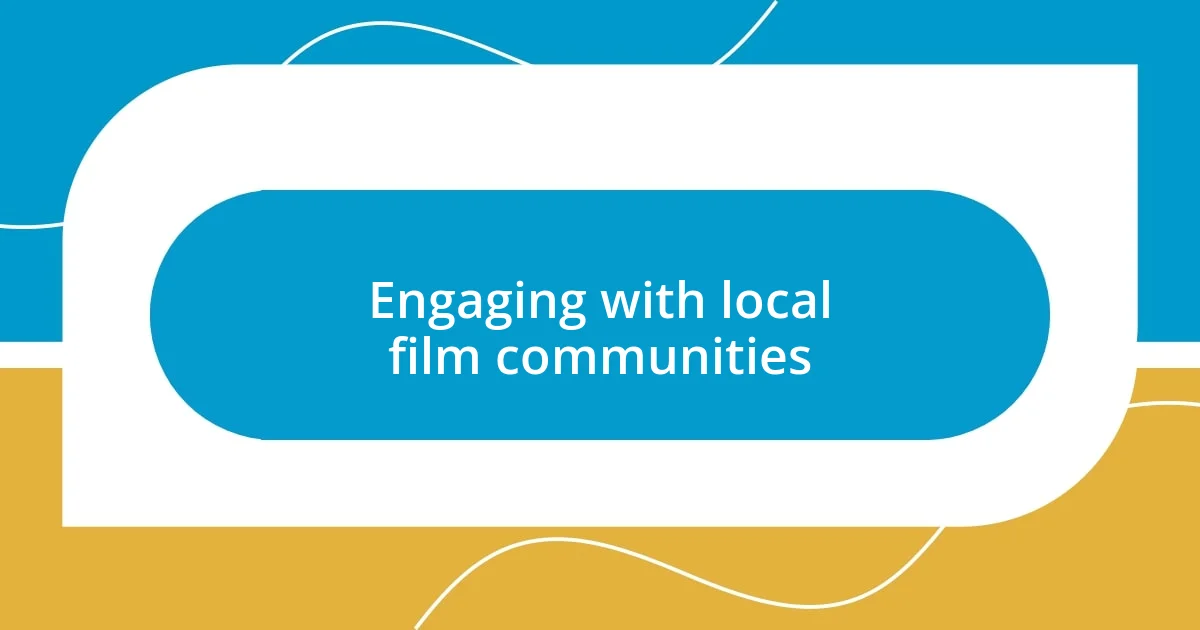
Engaging with local film communities
Engaging with local film communities has always been a rewarding aspect of my cinematic journey. I vividly remember attending a small screening in a cozy theater tucked away in my neighborhood. It felt like stepping into a secret world where everyone shared the same passion for storytelling. After the film, we gathered for a Q&A session with the director, and I was struck by how personal and intimate the conversation became. Listening to the filmmaker’s insights made me realize how deeply local narratives resonate with universal themes.
Participating in local film clubs has further enriched my engagement. I’ve facilitated discussions where we dissected new releases and classics together, uncovering layers of meaning that often go unnoticed. One night, we watched an Italian drama and debated the cultural nuances woven into the plot. It sparked such a vibrant conversation about identity and memory that I felt invigorated. How often do we get to explore these ideas in traditional cinema settings?
Moreover, volunteering at community screenings or local film initiatives has opened doors to meet like-minded enthusiasts. I recall my excitement when I helped organize a screening event that featured up-and-coming regional filmmakers. The energy was contagious, and it became a space for networking and collaboration. Watching the filmmakers interact with the audience brought back memories of my own early creative ventures, reminding me of the importance of community support. Have you ever felt that sense of connection while participating in local film events? It’s these experiences that truly deepen my love for European cinema.
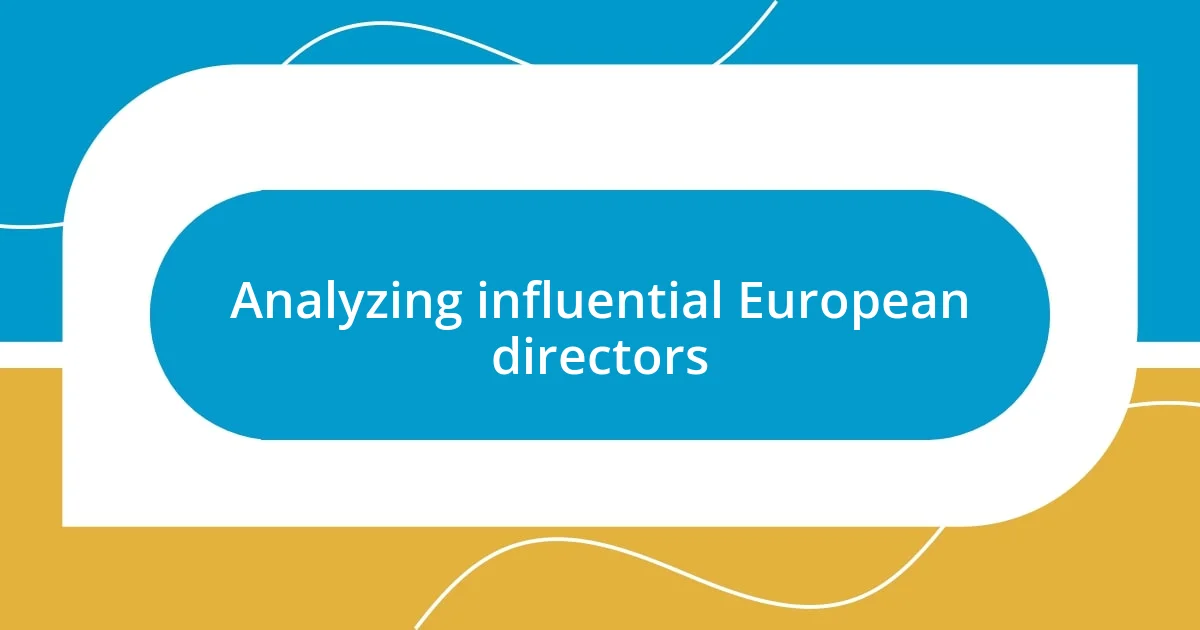
Analyzing influential European directors
Analyzing the works of influential European directors can feel like traversing a rich tapestry of culture and emotion. Take, for instance, the cinematic genius of François Truffaut, whose ability to capture the complexities of love within the context of everyday life is nothing short of mesmerizing. I remember watching “The 400 Blows” for the first time and feeling an intense connection to the raw emotions of adolescence. The way he portrayed childhood struggles had me reflecting on my own upbringing. Have you ever felt a film resonate with your life experiences so deeply?
Then there’s the masterful storytelling of Pedro Almodóvar, whose vibrant visuals and intricate characters challenge traditional narratives. His films, such as “Talk to Her,” reveal the multifaceted nature of human relationships, pulling me in with their colorful aesthetics and rich emotional undercurrents. While viewing one of his films, I often find myself pondering how art mirrors the complexity of our lives. Can you recall a moment in a movie that revealed a truth about your own life?
Lastly, I can’t discuss influential directors without mentioning Lars von Trier, whose provocative style and willingness to confront bold themes make his work extremely impactful. Watching “Breaking the Waves” was an emotional rollercoaster, leaving me questioning morality, faith, and love in unimaginable ways. I still grapple with the intensity of that experience. Have you ever walked away from a film, fully transformed by its themes and messages? Engaging with these directors not only broadens my appreciation for European cinema but also challenges me to reflect on my own perspectives and beliefs.
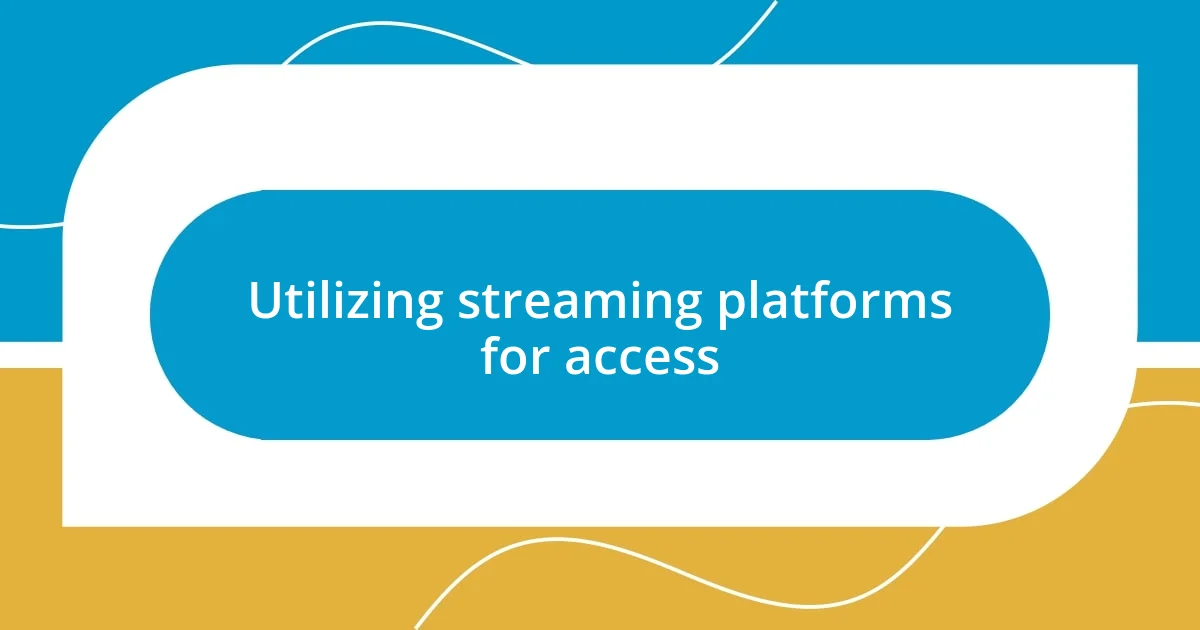
Utilizing streaming platforms for access
Utilizing streaming platforms has become my go-to strategy for accessing European films, especially when I want to explore lesser-known gems. I remember the excitement I felt discovering a hidden collection of French thrillers on a streaming service I’d almost forgotten about. It’s like treasure hunting! Have you ever stumbled upon a film that completely changed your evening?
I’ve particularly enjoyed the curated selections available on platforms like MUBI, where each film is handpicked and comes with thoughtful reviews. Watching a film from a different country often encourages me to look up the cultural context, adding another layer of richness to the experience. I vividly recall watching “A Fantastic Woman” on MUBI and being inspired by the nuanced storytelling around transgender identity in Chile. It prompted me to reflect on societal perceptions in my own community.
With streaming services constantly updating their catalogs, it’s a thrill to catch fresh European releases right when they debut. Just last month, I eagerly logged in to find an exclusive screening of a new Italian romantic comedy. The flexibility of streaming allows me to watch films on a whim, sometimes late at night when inspiration strikes or on lazy weekends that call for cinematic immersion. Isn’t it fascinating how technology can bring the world of European cinema right to our screens?
